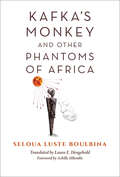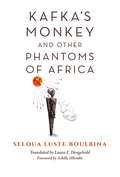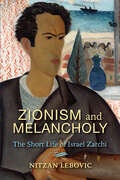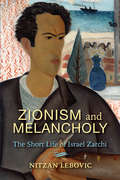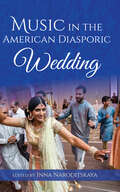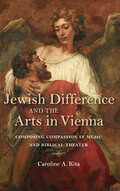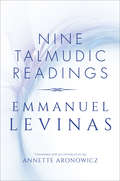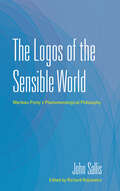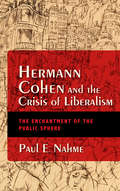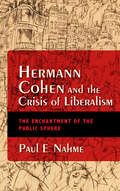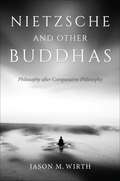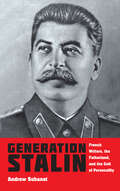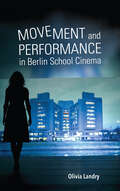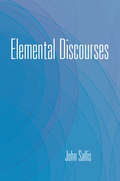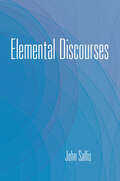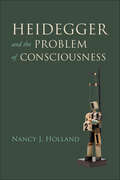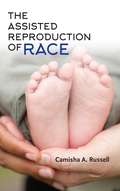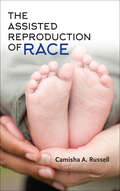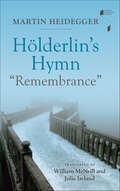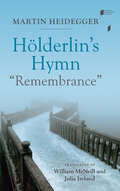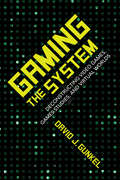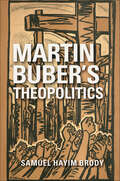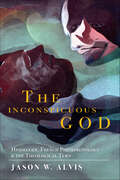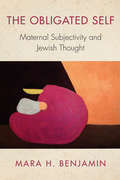- Table View
- List View
Kafka's Monkey and Other Phantoms of Africa (World Philosophies)
by Seloua Luste BoulbinaEven though many of France's former colonies became independent over fifty years ago, the concept of "colony" and who was affected by colonialism remain problematic in French culture today. Seloua Luste Boulbina, an Algerian-French philosopher and political theorist, shows how the colony's structures persist in the subjectivity, sexuality, and bodily experience of human beings who were once brought together through force. This text, which combines two works by Luste Boulbina, shows how France and its former colonies are haunted by power relations that are supposedly old history, but whose effects on knowledge, imagination, emotional habits, and public controversies have persisted vividly into the present. Luste Boulbina draws on the work of Michel Foucault, Frantz Fanon, and Édouard Glissant to build a challenging, original, and intercultural philosophy that responds to blind spots of inherited political and social culture. Kafka's Monkey and Other Phantoms of Africa offers unique insights into how issues of migration, religious and ethnic identity, and postcolonial history affect contemporary France and beyond.
Kafka's Monkey and Other Phantoms of Africa (World Philosophies)
by Seloua Luste BoulbinaEven though many of France’s former colonies became independent over fifty years ago, the concept of "colony" and who was affected by colonialism remain problematic in French culture today. Seloua Luste Boulbina, an Algerian-French philosopher and political theorist, shows how the colony’s structures persist in the subjectivity, sexuality, and bodily experience of human beings who were once brought together through force. This text, which combines two works by Luste Boulbina, shows how France and its former colonies are haunted by power relations that are supposedly old history, but whose effects on knowledge, imagination, emotional habits, and public controversies have persisted vividly into the present. Luste Boulbina draws on the work of Michel Foucault, Frantz Fanon, and Édouard Glissant to build a challenging, original, and intercultural philosophy that responds to blind spots of inherited political and social culture. Kafka's Monkey and Other Phantoms of Africa offers unique insights into how issues of migration, religious and ethnic identity, and postcolonial history affect contemporary France and beyond.
Zionism and Melancholy: The Short Life of Israel Zarchi (New Jewish Philosophy and Thought)
by Nitzan Lebovic“Lebovic reveals a great deal about the work of Zarchi and the melancholic mindset of an entire generation of contemporary Israelis . . . Highly recommended.” —ChoiceNitzan Lebovic claims that political melancholy is the defining trait of a generation of Israelis born between the 1960s and 1990s. This cohort came of age during wars, occupation and intifada, cultural conflict, and the failure of the Oslo Accords. The atmosphere of militarism and conservative state politics left little room for democratic opposition or dissent.Lebovic and others depict the failure to respond not only as a result of institutional pressure but as the effect of a long-lasting “left-wing melancholy.” In order to understand its grip on Israeli society, Lebovic turns to the novels and short stories of Israel Zarchi. For him, Zarchi aptly describes the gap between the utopian hope present in Zionism since its early days and the melancholic reality of the present. Through personal engagement with Zarchi, Lebovic develops a philosophy of melancholy and shows how it pervades Israeli society.
Zionism and Melancholy: The Short Life of Israel Zarchi (New Jewish Philosophy and Thought)
by Nitzan LebovicNitzan Lebovic claims that political melancholy is the defining trait of a generation of Israelis born between the 1960s and 1990s. This cohort came of age during wars, occupation and intifada, cultural conflict, and the failure of the Oslo Accords. The atmosphere of militarism and conservative state politics left little room for democratic opposition or dissent. Lebovic and others depict the failure to respond not only as a result of institutional pressure but as the effect of a long-lasting "left-wing melancholy." In order to understand its grip on Israeli society, Lebovic turns to the novels and short stories of Israel Zarchi. For him, Zarchi aptly describes the gap between the utopian hope present in Zionism since its early days and the melancholic reality of the present. Through personal engagement with Zarchi, Lebovic develops a philosophy of melancholy and shows how it pervades Israeli society.
Music in the American Diasporic Wedding
by Edited by Inna NaroditskayaWith real-life stories, this collection “focuses on the role of music in the often-delicate negotiations surrounding weddings in immigrant communities” (Ellen Koskoff, author of A Feminist Ethnomusicology).Music in the American Diasporic Wedding explores the complex cultural adaptations, preservations, and fusions that occur in weddings between couples and families of diverse origins. Discussing weddings as a site of negotiations between generations, traditions, and religions, the essays gathered here argue that music is the mediating force between the young and the old, ritual and entertainment, and immigrant lore and assimilation.The contributors examine such colorful integrations as klezmer-tinged Mandarin tunes at a Jewish and Taiwanese American wedding, a wedding services industry in Chicago’s South Asian community featuring a diversity of wedding music options, and Puerto Rican cultural activists dancing down the aisles of New York’s St. Cecilia’s church to the thunder of drums and maracas and rapping their marriage vows. These essays show us what wedding music and performance tell us about complex multiethnic diasporic identities, and remind us that how we listen to and celebrate otherness defines who we are.
Music in the American Diasporic Wedding
by Edited by Inna NaroditskayaWith real-life stories, this collection “focuses on the role of music in the often-delicate negotiations surrounding weddings in immigrant communities” (Ellen Koskoff, author of A Feminist Ethnomusicology).Music in the American Diasporic Wedding explores the complex cultural adaptations, preservations, and fusions that occur in weddings between couples and families of diverse origins. Discussing weddings as a site of negotiations between generations, traditions, and religions, the essays gathered here argue that music is the mediating force between the young and the old, ritual and entertainment, and immigrant lore and assimilation.The contributors examine such colorful integrations as klezmer-tinged Mandarin tunes at a Jewish and Taiwanese American wedding, a wedding services industry in Chicago’s South Asian community featuring a diversity of wedding music options, and Puerto Rican cultural activists dancing down the aisles of New York’s St. Cecilia’s church to the thunder of drums and maracas and rapping their marriage vows. These essays show us what wedding music and performance tell us about complex multiethnic diasporic identities, and remind us that how we listen to and celebrate otherness defines who we are.
Jewish Difference and the Arts in Vienna: Composing Compassion in Music and Biblical Theater (German Jewish Cultures)
by Caroline A. KitaThis study “brings to life a circle of writers and composers, with analyses of their major, minor . . . and forgotten works of Jewish music theater” (Abigail Gillman, author of Viennese Jewish Modernism).During the mid-19th century, the works of Arthur Schopenhauer and Richard Wagner sparked an impulse toward German cultural renewal and social change that drew on religious myth, metaphysics, and spiritualism. The only problem was that their works were deeply antisemitic and entangled with claims that Jews were incapable of creating compassionate art. By looking at the works of Jewish composers and writers who contributed to a lively and robust biblical theatre in fin de siècle Vienna, Caroline A. Kita shows how they reimagined myths of the Old Testament to offer new aesthetic and ethical views of compassion.These Jewish artists, including Gustav Mahler, Siegfried Lipiner, Richard Beer-Hofmann, Stefan Zweig, and Arnold Schoenberg, reimagined biblical stories through the lens of the modern Jewish subject to plead for justice and compassion toward the Jewish community. By tracing responses to antisemitic discourses of compassion, Kita reflects on the explicitly and increasingly troubled political and social dynamics at the end of the Habsburg Empire.
Nine Talmudic Readings
by Emmanuel LevinasThese nine masterful readings of the Talmud by the renowned French Jewish philosopher translate Jewish thought into the language of modern times.One of the major continental philosophers of the twentieth century, Emmanuel Levinas was also an important Talmudic commentator. Between 1963 and 1975, he delivered an enlightening and influential series of commentaries at the annual Talmudic colloquia of a group of French Jewish intellectuals in Paris. In this collection, Levinas applies a hermeneutic that simultaneously allows the classic Jewish texts to shed light on contemporary problems and lets modern problems illuminate the texts. Besides being quintessential illustrations of the art of reading, the essays express the deeply ethical vision of the human condition that makes Levinas one of the most important thinkers of our time.
The Logos of the Sensible World: Merleau-Ponty's Phenomenological Philosophy (The Collected Writings of John Sallis #III, 10)
by John SallisA presentation of the two-semester lecture course on Merleau-Ponty given at Duquesne University from 1970 to 1971 by the esteemed American philosopher.Devoted primarily to a close reading of the French philosopher’s magnum opus, Phenomenology of Perception, this course begins with a detailed analysis of The Structure of Behavior. The central topics considered in the lectures include the functions of the phenomenological body; beyond realism and idealism; the structures of the lived world; spatiality, temporality, language, sexuality; and perception and knowledge. Sallis illuminates Merleau-Ponty’s first two works and offers a thread to follow through developments in his later essays. Merleau-Ponty’s notion of the primacy of perception and his claim that “the end of a philosophy is the account of its beginning” are woven throughout the lectures. For Sallis’s part, these lectures are foundational for his extended engagement with Merleau-Ponty’s The Visible and the Invisible, which was published in Sallis’s Phenomenology and the Return to Beginnings.“Sallis has managed to write a review that is accessible and makes only modest demands on the reader. This is an ideal resource for nonspecialists and for those who want a straightforward, relatively brief treatment of Merleau-Ponty’s important book . . . Highly recommended.” —Choice
Hermann Cohen and the Crisis of Liberalism: The Enchantment of the Public Sphere (New Jewish Philosophy and Thought)
by Paul E. NahmeHermann Cohen (1842–1918) is often held to be one of the most important Jewish philosophers of the nineteenth century. Paul E. Nahme, in this new consideration of Cohen, liberalism, and religion, emphasizes the idea of enchantment, or the faith in and commitment to ideas, reason, and critique—the animating spirits that move society forward. Nahme views Cohen through the lenses of the crises of Imperial Germany—the rise of antisemitism, nationalism, and secularization—to come to a greater understanding of liberalism, its Protestant and Jewish roots, and the spirits of modernity and tradition that form its foundation. Nahme’s philosophical and historical retelling of the story of Cohen and his spiritual investment in liberal theology present a strong argument for religious pluralism and public reason in a world rife with populism, identity politics, and conspiracy theories.
Hermann Cohen and the Crisis of Liberalism: The Enchantment of the Public Sphere (New Jewish Philosophy and Thought)
by Paul E. NahmeA fresh look at a nineteenth-century Jewish philosopher whose theology offers a beacon in an illiberal twenty-first century world: “Recommended.” —ChoiceHermann Cohen is often held to be one of the most important Jewish philosophers of the nineteenth century. Paul E. Nahme, in this new consideration of Cohen, liberalism, and religion, emphasizes the idea of enchantment, or the faith in and commitment to ideas, reason, and critique—the animating spirits that move society forward.Nahme views Cohen through the lenses of the crises of Imperial Germany—the rise of antisemitism, nationalism, and secularization—to come to a greater understanding of liberalism, its Protestant and Jewish roots, and the spirits of modernity and tradition that form its foundation. Nahme’s philosophical and historical retelling of the story of Cohen and his spiritual investment in liberal theology present a strong argument for religious pluralism and public reason in a world rife with populism, identity politics, and conspiracy theories.
Nietzsche and Other Buddhas: Philosophy after Comparative Philosophy (World Philosophies Ser.)
by Jason M. Wirth“A tour de force that both challenges and expands our understanding of the very practice of philosophy . . . and comparative philosophy in particular” (Joseph Markowski, Reading Religion).In Nietzche and Other Buddhas, author Jason M. Wirth brings major East Asian Buddhist thinkers into radical dialogue with key Continental philosophers through a series of exercises that pursue what is traditionally called comparative or intercultural philosophy. In the process, he reflects on what makes such exercises possible and intelligible. The primary questions Wirth asks are: How does this particular engagement and confrontation challenge and radicalize what is sometimes called comparative or intercultural philosophy? How does this task reconsider what is meant by philosophy? The confrontations that Wirth sets up between Dogen, Hakuin, Linji, Shinran, Nietzsche, Schopenhauer, James, and Deleuze consider the nature of philosophy—and especially comparative philosophy—from a global perspective. This global perspective in turn opens up a new and challenging space of thought within and between the cutting edges of Western Continental philosophy and East Asian Buddhist practice.
Generation Stalin: French Writers, the Fatherland, and the Cult of Personality
by Andrew SobanetA look at how four French writers of the 1930s, ‘40s, and ‘50s contributed to the rise of Stalin in their country and abroad.Generation Stalin traces Joseph Stalin’s rise as a dominant figure in French political culture from the 1930s through the 1950s. Andrew Sobanet brings to light the crucial role French writers played in building Stalin’s cult of personality and in disseminating Stalinist propaganda in the international Communist sphere, including within the USSR. Based on a wide array of sources—literary, cinematic, historical, and archival—Generation Stalin situates in a broad cultural context the work of the most prominent intellectuals affiliated with the French Communist Party, including Goncourt winner Henri Barbusse, Nobel laureate Romain Rolland, renowned poet Paul Eluard, and canonical literary figure Louis Aragon. Generation Stalin arrives at a pivotal moment, with the Stalin cult and elements of Stalinist ideology resurgent in twenty-first-century Russia and authoritarianism on the rise around the world.“This is an outstanding work of intellectual history. . . . Highly recommended.” —Choice“A landmark study, brilliantly written, containing exemplary scholarship. Sobanet establishes himself with this volume as one of the foremost interpreters of French intellectual life. He brings to his study a cornucopia of historical knowledge and the finesse of a first-class literary critic.” —Lawrence D. Kritzman, editor of The Columbia History of Twentieth-Century French Thought“This is an ambitious project that is well executed, with a readership that is potentially far reaching—with implications for Russian/Stalin studies, French studies, including politics and society, as well as propaganda writing and the role of the media more generally. . . . Generation Stalin is a very timely book.” —Denis M. Provencher, author of Queer French: Globalization, Language, and Sexual Citizenship in France“Sobanet’s study of “Generation Stalin” and the four writers he associates with the group, Henri Barbusse, Romain Rolland, Paul Eluard, and Louis Aragon, is, quite simply, magisterial. Written in lucid prose informed by meticulous and wide-ranging scholarship including archival material, books, essays, press items, and other relevant documents, the book provides an in-depth study of the rise of the Stalin cult in France.” —Carol J. Murphy, author of The Allegorical Impulse in the Works of Julien Gracq: History as Rhetorical Enactment in “Le Rivage des Syrtes” and “Un Balcon en forêt”
Movement and Performance in Berlin School Cinema (New Directions in National Cinemas)
by Olivia Landry“A rich and welcome addition to the surge of scholarly interest in the Berlin School.” —Studies in European CinemaThrough a study of the contemporary German film movement the Berlin School, Olivia Landry examines how narrative film has responded to our highly digitalized and mediatized age, not with a focus on stasis and realism, but by turning back to movement, spectacle, and performance.She argues that a preoccupation with presence, liveness, and affect—all of which are viewed as critical components of live performance—can be found in many of the films of the Berlin School. Challenging the perception that the Berlin School is a sheer adherent of “slow cinema,” Landry closely analyzes the use of movement, dynamism, presence, and speed in a broad selection of films to show how filmmakers such as Christian Petzold, Angela Schanelec, Thomas Arslan, and Christoph Hochhäusler invoke the pulse of the kinesthetic and the tangibly affective. Her analysis draws on an array of film theories from early materialism to body theories, phenomenology, and contemporary affect theories. Arguing that these theories readily and energetically forge a path from film to performance, Landry traces a trajectory between the two through which live experience, presence, spectacle, intersubjectivity, and the body in motion emerge and powerfully intersect. Ultimately, Movement and Performance in Berlin School Cinema expands the methodological and disciplinary boundaries of film studies by offering new ways of articulating and understanding movement in cinema.
Elemental Discourses (The Collected Writings of John Sallis #II, 4)
by John SallisJohn Sallis's thought is oriented to two overarching tasks: to bring to light the elemental in nature and to show how the imagination operates at the very center of human experience. He undertakes these tasks by analyzing a broad range of phenomena, including perception, the body, the natural world, art, space, and the cosmos. In every case, Sallis develops an original form of discourse attuned to the specific phenomenon and enacts a thorough reflection on discourse itself in its relation to voice, dialogue, poetry, and translation. Sallis's systematic investigations are complemented by his extensive interpretations of canonical figures in the history of philosophy such as Plato, Aristotle, Kant, Schelling, and Hegel and by his engagement with the most original thinkers in the areas of phenomenology, hermeneutics, and deconstruction.
Elemental Discourses (The\collected Writings Of John Sallis Ser. #Ii, 4)
by John Sallis“A remarkable collection of essays that serve as a rewarding introduction to the more mature thought of Sallis . . . a feast of discourse.” —Notre Dame Philosophical ReviewsJohn Sallis’s thought is oriented to two overarching tasks: to bring to light the elemental in nature and to show how the imagination operates at the very center of human experience. He undertakes these tasks by analyzing a broad range of phenomena, including perception, the body, the natural world, art, space, and the cosmos. In every case, Sallis develops an original form of discourse attuned to the specific phenomenon and enacts a thorough reflection on discourse itself in its relation to voice, dialogue, poetry, and translation. Sallis’s systematic investigations are complemented by his extensive interpretations of canonical figures in the history of philosophy such as Plato, Aristotle, Kant, Schelling, and Hegel and by his engagement with the most original thinkers in the areas of phenomenology, hermeneutics, and deconstruction.
Heidegger and the Problem of Consciousness
by Nancy J. HollandNancy J. Holland turns to the thought of Martin Heidegger to help understand an age-old philosophical question: Is there a split between the body and the mind? Arguing against philosophical positions that define human consciousness as an overarching phenomenon or reduce it to the brain or physicality, Holland contends that consciousness is relational and it is this relationship that allows us to inhabit and negotiate in the world. Holland forwards a complex and nuanced reading of Heidegger as she focuses on consciousness, being, and what might constitute the animal or, more broadly, other-than-human world. Holland engages with the depth and breadth of Heidegger's work as she opens space for a discussion about the uniqueness of human consciousness.
The Assisted Reproduction of Race
by Camisha A. RussellThe use of assisted reproductive technologies (ART)--in vitro fertilization, artificial insemination, and gestational surrogacy--challenges contemporary notions of what it means to be parents or families. Camisha A. Russell argues that these technologies also bring new insight to ideas and questions surrounding race. In her view, if we think of ART as medical technology, we might be surprised by the importance that people using them put on race, especially given the scientific evidence that race lacks a genetic basis. However if we think of ART as an intervention to make babies and parents, as technologies of kinship, the importance placed on race may not be so surprising after all. Thinking about race in terms of technology brings together the common academic insight that race is a social construction with the equally important insight that race is a political tool which has been and continues to be used in different contexts for a variety of ends, including social cohesion, economic exploitation, and political mastery. As Russell explores ideas about race through their role in ART, she brings together social and political views to shift debates from what race is to what race does, how it is used, and what effects it has had in the world.
The Assisted Reproduction of Race
by Camisha A. RussellA philosopher examines the social implications of assisted reproductive technologies at the intersection of race, medicine, and bioethics.The use of assisted reproductive technologies (ART)—in vitro fertilization, artificial insemination, and gestational surrogacy—challenges contemporary notions of what it means to be parents or families. Camisha A. Russell argues that these technologies also bring new insight to ideas and questions surrounding race. She does this in part by reframing ART, as medical technologies that also act as technologies of kinship.Thinking about race in terms of technology brings together the common academic insight that race is a social construction with the equally important insight that race is a political tool used in different contexts for a variety of ends. As Russell explores ideas about race through their role in ART, she brings together social and political views to shift debates from what race is to what race does, how it is used, and what effects it has had in the world.
Hölderlin's Hymn "Remembrance" (Studies in Continental Thought)
by Martin HeideggerMartin Heidegger's 1941–1942 lecture course on Friedrich Hölderlin's hymn, "Remembrance," delivered immediately following his confrontation with Nietzsche, lays out a detailed plan for the interpretation of Hölderlin's poetry in which remembrance is a central concern. With its emphasis on the "free use of the national" and the "holy of the fatherland," the course marks an important progression in Heidegger's political thought. In addition to its startlingly innovative analyses of greeting, the festive, and the dream, the text provides Heidegger's fullest elaboration of the structure of commemorative thinking in relationship to time and the possibility of an "other beginning." This English translation by William McNeill and Julia Ireland completes the series of Heidegger's major lecture courses on Hölderlin.
Hölderlin's Hymn "Remembrance" (Studies in Continental Thought)
by Martin Heidegger“This faithful and readable translation . . . serves as a critical orientation to interpreting Heidegger’s later thought” inspired by Hölderlin’s poetry (Christopher D. Merwin, Emory University).Over the course of 1941–42, Martin Heidegger delivered a lecture course on Friedrich Hölderlin’s hymn, “Remembrance.” Immediately following his confrontation with Nietzsche, it lays out a detailed plan for the interpretation of Hölderlin’s poetry in which remembrance is a central concern. With its emphasis on the “free use of the national” and the “holy of the fatherland,” the course marks an important progression in Heidegger’s political thought.In addition to its startlingly innovative analyses of greeting, the festive, and the dream, the text provides Heidegger’s fullest elaboration of the structure of commemorative thinking in relationship to time and the possibility of an “other beginning.” This English translation by William McNeill and Julia Ireland completes the series of Heidegger’s major lecture courses on Hölderlin.
Gaming the System: Deconstructing Video Games, Games Studies, and Virtual Worlds (Digital Game Studies)
by David J. GunkelGaming the System takes philosophical traditions out of the ivory tower and into the virtual worlds of video games. In this book, author David J. Gunkel explores how philosophical traditions—put forth by noted thinkers such as Plato, Descartes, Kant, Heidegger, and Žižek—can help us explore and conceptualize recent developments in video games, game studies, and virtual worlds. Furthermore, Gunkel interprets computer games as doing philosophy, arguing that the game world is a medium that provides opportunities to model and explore fundamental questions about the nature of reality, personal identity, social organization, and moral conduct. By using games to investigate and innovate in the area of philosophical thinking, Gunkel shows how areas such as game governance and manufacturers’ terms of service agreements actually grapple with the social contract and produce new postmodern forms of social organization that challenge existing modernist notions of politics and the nation state. In this critically engaging study, Gunkel considers virtual worlds and video games as more than just "fun and games," presenting them as sites for new and original thinking about some of the deepest questions concerning the human experience.
Martin Buber's Theopolitics (New Jewish Philosophy and Thought)
by Samuel Hayim BrodyHow did one of the greatest Jewish thinkers of the 20th century grapple with the founding of Israel and the Israeli-Palestinian conflict—one of the most significant political conflicts of his time? Samuel Hayim Brody traces the development of Martin Buber's thinking and its implications for the Jewish religion, for the problems posed by Zionism, and for the Zionist-Arab conflict. Beginning in turbulent Weimar Germany, Brody shows how Buber's debates about Biblical meanings had concrete political consequences for anarchists, socialists, Zionists, Nazis, British, and Palestinians alike. Brody further reveals how Buber's passionate commitment to the rule of God absent an intermediary came into conflict in the face of a Zionist movement in danger of repeating ancient mistakes. Brody argues that Buber's support for Israel stemmed from a radically rich and complex understanding of the nature of the Jewish mission on earth that arose from an anarchist reading of the Bible.
The Inconspicuous God: Heidegger, French Phenomenology & the Theological Turn (Indiana Series in the Philosophy of Religion)
by Jason W. AlvisDominique Janicaud once famously critiqued the work of French phenomenologists of the theological turn because their work was built on the seemingly corrupt basis of Heidegger's notion of the inapparent or inconspicuous. In this powerful reconsideration and extension of Heidegger's phenomenology of the inconspicuous, Jason W. Alvis deftly suggests that inconspicuousness characterizes something fully present and active, yet quickly overlooked. Alvis develops the idea of inconspicuousness through creative appraisals of key concepts of the thinkers of the French theological turn and then employs it to describe the paradoxes of religious experience.
The Obligated Self: Maternal Subjectivity and Jewish Thought (New Jewish Philosophy and Thought)
by Mara H. BenjaminMara H. Benjamin contends that the physical and psychological work of caring for and rearing children, for centuries the province of women, is theologically fruitful but a largely unexplored terrain for feminists. Attending to the constant, concrete, and urgent needs of children, she notes, necessitates engaging with profound questions concerning the responsible use of power in unequal relationships, the transformative influence of love, human fragility and vulnerability, and the embeddedness of self in relationships and obligations. Benjamin focuses on how parents and children negotiate these issues as Jews and how these relationships advance Jewish theological, ethical, and existential inquiry. Viewing child-rearing as an embodied practice, Benjamin’s theological reflection invites a profound reengagement with key Jewish theological thinkers such as Martin Buber, Franz Rosenzweig, and Emmanuel Levinas. Her contemporary feminist stance forges a convergence between Jewish theological anthropology and the demands of parental caregiving.
